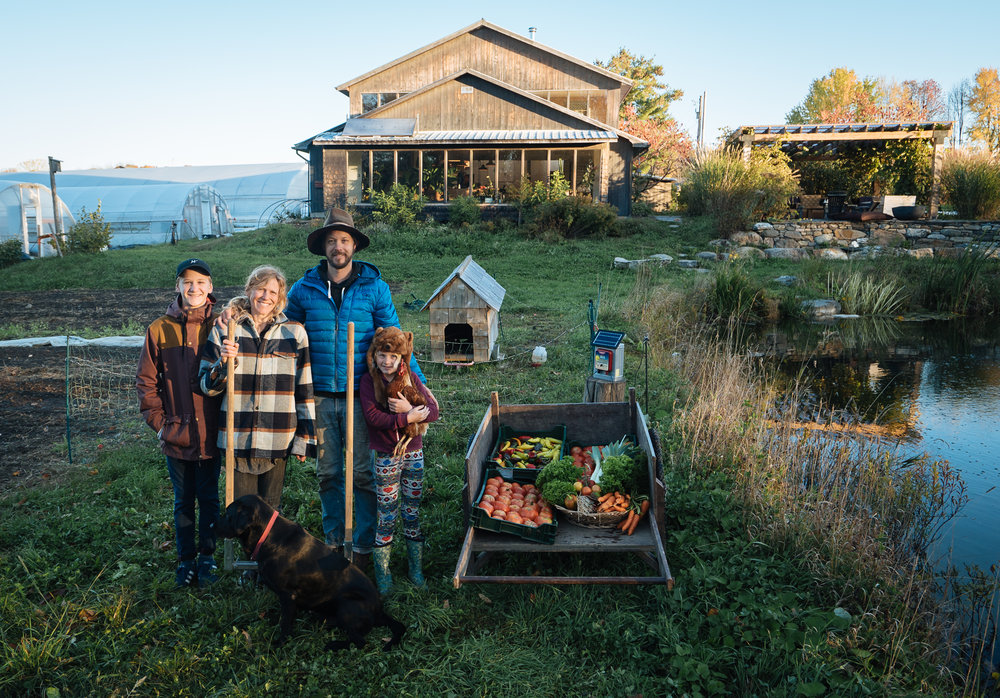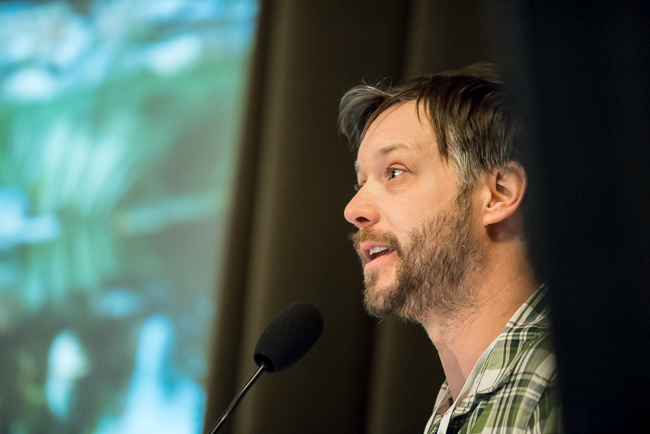
Farmer, educator, and award-winning author Jean-Martin “JM” Fortier shared “Appropriate Tools and Technologies for the Emerging Small-Scale Market Gardener” at this EcoFarm workshop. Using his farm as a model, JM shared why bigger is not always better when it comes to farming.
In 2004, inspired by the small scale, raised bed gardens he observed on a visit to Cuba, larger scale farmers he met in France who preferred hand tools over tractors, and Eliot Coleman’s The New Organic Grower, JM began his own 1.5 acre farm.
His farm has not grown in size since its creation, yet the farm continues to grow in profits. By minimizing costs and equipment, and through direct-selling to the community, JM’s farm has become incredibly successful despite, or as JM would argue, because of, its small size.
Every inch of JM’s farm was designed with efficiency in mind and this has been key to its success. The washing station is in the center of the farm, which saves time when walking crops to the station after harvesting. The beds are 30 inches wide with 18 inch pathways. “People ask me, why 18 inches? Why not 12 or 14 inches?” The reason, JM explains, is that a pathway of 18 inches allows for comfort and room to move around between beds, as well as space for JM’s 18 inch harvesting crates.
The raised beds are 30 inches wide because the hand tools that JM started out with were all standardized to work in 30 inch beds. Within these raised beds, crops are planted very close together which makes for more efficient farming since the farmer doesn’t have to travel long distances to harvest each crop. Utilizing less space also makes the task of identifying pests or plant diseases easier, which can mean faster action to remedy these potential issues.

Despite the nay-saying of small market gardens by many large-scale growers, JM says, “This is my 17th growing season and I can tell you...there’s no reason this shouldn’t work if you’re paying attention to biology and the soil.” It’s simply about looking at farming from a different perspective, he says.
"It’s about utilizing time and labor efficiently, not about growing one’s acreage or toolshed."
A few tools are extremely helpful to the market gardener, however, and JM shared some essentials that can increase productivity and profitability on small-scale farms. These tools include the Bio-Disc from Terrateck which cultivates two rows in one pass and is 10 times faster than weeding with a stump hoe, the Flex-Tine Weeder from Two Bad Cats LLC which destroys small weeds while bouncing away from established crops and allows for blind weeding of beds while weeds are at the white-thread stage, a calendar of when to perform tasks like planting, weeding, etc. throughout the year, and the farm’s washing station.
Because so much time is spent washing produce, an efficient washing station is of utmost importance. “I knew from experience that half of your time spent working on the farm will be spent harvesting, washing, and packing,” JM explained. His washing station includes a “bubbler,” that uses a jacuzzi air pump blowing into PVC pipes that loosens dirt and debris from produce making it easier to clean, as well as a converted washing machine that spin-dries produce. JM stressed that all this equipment is cheap and easy to build, making it accessible to new farmers who don’t want to spend a lot of money.
Another type of technology that has helped JM is Tend's software platform which "records at the same time as it’s planning and it allows you to do so many more things that a simple excel spreadsheet can’t. It allows you to systemize and customize your production plan into a game plan that you can then follow...it’s just awesome. For the price that it costs you’d be a fool not to use it," commented Fortier.
JM figured out his model of farming through trial and error. His family did not farm and he says, “Organic wasn’t even invented in my universe when I was growing up.” He started from scratch with $40,000 and a third of an acre and lived in a tipi for a couple of years before moving up into a barn. His farm now grosses $100,000 per acre annually.
JM hopes to help new and young farmers succeed running small farms through his book The Market Gardener, his new 10-acre farm, Ferme des Quatre-Temps, and with his online Market Gardener’s Masterclass. JM believes that it’s important to have an advocate for small farms and aims to show that, “not only is small possible, it’s profitable.”
If you’d like to hear more from JM and other conference presenters, you can now purchase the workshop audio recordings at https://eco-farm.org/ecofarm-shop
Watch JM's Keynote presentation as a Successful Organic Farmer on YouTube

